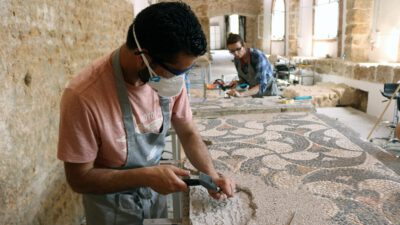 Egyptian model for the Zabaleen could help heat Syrian refugees. Green Prophet’s Joseph reports from Jordan.
Egyptian model for the Zabaleen could help heat Syrian refugees. Green Prophet’s Joseph reports from Jordan.
Zaatari Refugee Camp in Jordan: Walking through the vast expanse of white tents, dirt “roads” and masses of families huddled closely together for warmth, if you ask what they most need, the answer, without pause, is simple: blankets. In late November and early December, I was walking through the Zaatari refugee camp in northern Jordan along the Syrian border, and the Syrian refugees are surprisingly open and frank.
Despite the destruction and death that they witnessed across the border, they remain optimistic about the future. As I was leaving the camp, an idea struck me: why not use biofuel to give power to the tents, at least deliver some form of heat to combat the encroaching winter cold?
Back in Amman, Jordan, I talked to a number of NGOs who listened patiently to this idea. They would nod and smile, say this could be a useful idea, but how could it be implemented, was the question that continued to be broached. They are right. Without adequate funding to supply the tens of thousands of refugees with blankets, biofuel is not high on anyone’s agenda.
A few years ago in Cairo, I met T.H. Culhane, a professor from the University of California at Los Angeles who had begun to develop biofuel and biogas for residents in Cairo’s downtrodden outskirts to deliver enough power for a few hours of cooking. His model was simple.
Instead of maintaining the rigid plans for the digesters that he and others had been using, Culhane compiled local material and, in a sense, winged it, employing local people to help create functioning digesters that are able to provide homes with a few hours of gas daily. Trash can also be employed to give heat, as Israel has seen possible.
Cutting costs was easier than expected. He said in 2010 that they could make a digester for less than $200 and as the communities continues to see that it can be successful, he envisions more digesters coming to fruition as funding comes in.
Biogas can be used as a low-cost fuel in any country for any heating purpose, such as cooking. In Egypt, Culhane employed kitchen waste as the main source of making the digesters work. Residents could collect the organic waste left over from the day’s cooking, take it up to the digester, put it in and this releases methane that can then travel through pipes into the stove or oven for cooking purposes.
My idea for Syrian camps, which when I went back to Zaatari the following day became clear to its validity, was to employ the refugees to help use the leftover waste from the cooking process to develop biogas that could be used for mobile heaters that could be given to families with young children, the most in danger of succumbing to the winter elements.
While this idea needs, and deserves, more research, I believe that following the Culhane model, even reaching out to him in particular, could help bring some warmth to a people in desperate need in order to survive the harsh winter without the friendly confines of a home.
Above image by Joseph Mayton for Green Prophet




Anyone heard what the situation with animals is in Syria? Have any rescue groups been able to access the area to help?